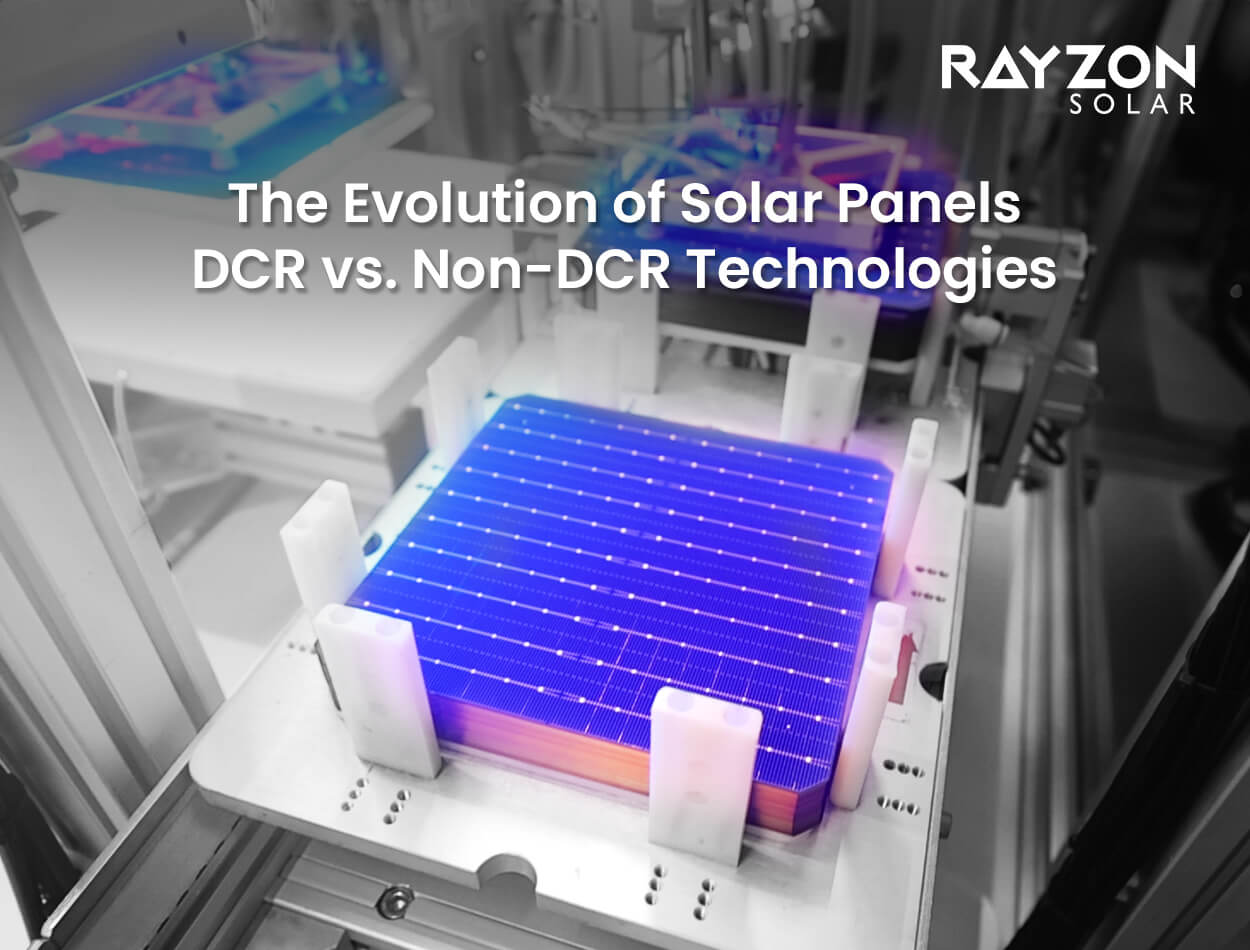
The Evolution of Solar Panels: DCR vs. Non-DCR Technologies
In the ever-evolving world of solar energy, new technologies continually improve efficiency and innovation. Two recent developments are Dual Glass Crystalline Silicon (DCR) and Non-DCR solar panels. Each of these technologies has distinct benefits and applications. As the demand for renewable energy solutions grows, it is crucial to understand the differences, advantages, and considerations between these two cutting-edge solar technologies. In this detailed examination, we will explore the facts of DCR and Non-DCR panels, uncovering their functions, efficiency metrics, and suitability for various applications. By examining these advanced solar technologies, consumers can make well-informed decisions that match their energy needs with the most suitable panel option.
Let's explore the difficulties of DCR and non-DCR solar panels together, empowering individuals and businesses to harness solar power for a sustainable future.
Introduction to DCR and Non-DCR Solar Panels
Rayzon Solar, a Leading name in the renewable energy sector, stands at the forefront of solar panel innovation. With a commitment to sustainability and quality, Rayzon Solar leads the way in providing top-tier solar solutions for residential, commercial, and industrial applications.
Understanding DCR Solar Panels
DCR solar panels known as Double-Glass Crystalline Silicon panels, feature a durable dual-glass construction that offers strong performance and longevity. These panels are designed to withstand challenging environmental conditions, making them ideal for demanding climates. Rayzon Solar specializes in manufacturing DCR panels, using advanced technology to ensure maximum efficiency and reliability.
Exploring Non-DCR Solar Panels
On the other hand, non-DCR solar panels are considered by their traditional single-glass design. While they may not offer the enhanced durability of DCR panels, non-DCR variants remain a popular choice for residential installations due to their affordability and flexibility. Rayzon Solar offers a diverse range of non-DCR panels tailored to meet the needs of homeowners and businesses.
Comparing Efficiency and Performance
When it comes to efficiency, both DCR and non-DCR solar panels have their strengths. DCR panels excel in tough environments, thanks to their strong construction and superior weather resistance. Non-DCR panels, while kind of less durable, remain highly efficient and cost-effective for standard residential and commercial installations.
The Role of Bifacial Technology
Bifacial modules, a revolutionary innovation in solar technology, offer increased energy production by capturing sunlight from both the front and rear sides of the panel. Rayzon Solar integrates Bifacial technology into its panel offerings, providing customers with enhanced efficiency and performance in various applications.
Read More: Rayzon Solar | Bifacial Technology
Making the Right Choice
Choosing between DCR and non-DCR solar panels depends on various factors, including budget, location and specific energy needs. Rayzon Solar, with its wide expertise and diverse product range, helps customers navigate these decisions, ensuring they select the optimal solution for their unique requirements.
Key Considerations
Manufacturing Location:
One of the primary differences between DCR and non-DCR solar PV modules is the manufacturing location of the solar cells and modules. DCR modules are typically manufactured domestically, within the country where they are installed, fostering local production and job creation. On the other hand, non-DCR Solar cells are often imported from various global manufacturers, offering a wider range of options but potentially bypassing domestic manufacturing benefits.
Policy Compliance:
DCR modules follow the Domestic Content Requirement policy mandated by the government, aimed at promoting the use of locally manufactured solar panels and supporting the domestic solar industry. Projects utilizing DCR modules are typically eligible for certain incentives, subsidies, or government schemes. In contrast, non-DCR modules do not have this requirement and can be sourced globally, providing flexibility but potentially missing out on policy-driven benefits.
Project Eligibility:
The Ministry of New and Renewable Energy (MNRE) specifies the projects eligible for DCR requirements, particularly those associated with subsidies, incentives, or programs such as the CPSU scheme (Government of India's Central Public Sector Undertaking Scheme). Projects that fall under the DCR policy must use domestically manufactured solar modules to qualify for these benefits. Conversely, non-DCR modules are used in projects that do not fall under the DCR policy, offering versatility but potentially excluding certain government incentives or support.
The Future of Solar Energy
As the world increasingly embraces renewable energy sources, solar technology continues to evolve. With ongoing advancements in efficiency, durability, and affordability, solar power remains a cornerstone of the transition to a sustainable future. Rayzon Solar remains dedicated to driving this transformation, offering cutting-edge solar solutions that empower individuals and businesses to harness the power of the sun.
Conclusion
In the ever-changing landscape of solar energy, the choice between DCR and non-DCR panels represents a crucial decision for consumers seeking the most suitable solution for their specific needs. With Rayzon Solar at the forefront of innovation and quality assurance, customers can confidently trust on the reliability and outstanding performance of their solar investments. Whether opting for DCR panels renowned for their rough durability or non-DCR panels prized for their cost-effective efficiency, Rayzon Solar offers tailored solutions to meet diverse energy requirements. By partnering with Rayzon Solar, individuals and businesses can take significant strides toward embracing renewable energy and contributing to a sustainable future. With a commitment to excellence and sustainability, Rayzon Solar empowers customers to make environmentally responsive choices while paving the way for a greener and more sustainable tomorrow.
READ MORE
• Top Solar Technology Trends of 2024: Key Information to Stay Updated • Bifacial Solar Panels: Maximizing Energy Production with Dual-Sided Efficiency